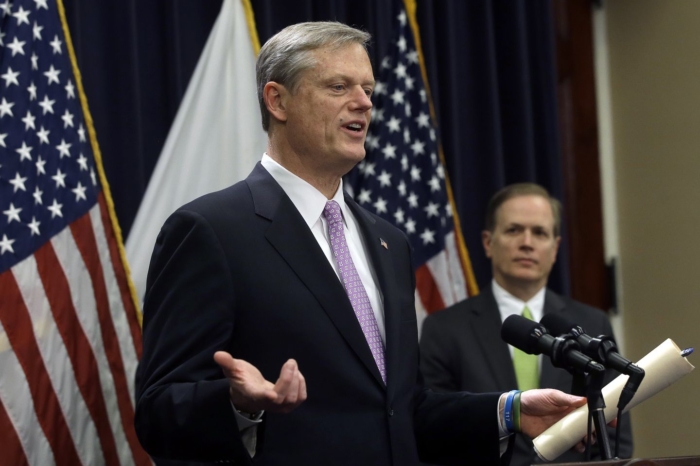Tell state & school leaders to ensure our kids get a quality education this fall!
/0 Comments/in News /by Editorial Staff Share on Facebook
Share on Twitter
Share on
LinkedIn
+
As the coronaviruscontinues in Massachusetts this fall, the education of our children should be atop priority for our state & school district leaders. Many schools didn’tcontinue rigorous instruction during the shutdown.
They didn’t provide dailyschedules, take attendance or ensure daily interaction between teachers andstudents – as a result, our kids lost a third of their academic year.
MA state &district leaders are making school re-opening plans now, that could includeat-home schooling and hybrid options in the fall.
Sign the petition below and tell them that our kids need to continue to learn even if they’re not in a school building.
View our additional education resources:

Key Madison Park Program Lags Other State Voc-Techs, but Shows Signs of Improvement
The co-operative education program at Boston’s Madison Park Technical Vocational High School, which places students in paid positions with local employers, lags far behind other Massachusetts vocational-technical schools in terms of both placements and number of employer contacts. But with the school as a whole beginning to improve after years of turmoil, the co-op is also showing promising signs, according to a new study published by Pioneer Institute.

Ayaan Hirsi Ali, International Best-Selling Author & Human Rights Activist
This week on “The Learning Curve," Gerard and Cara talk with Ayaan Hirsi Ali, a Research Fellow at the Hoover Institution, founder of the AHA Foundation, and author of the books Prey: Immigration, Islam, and the Erosion of Women's Rights, Infidel: My Life, and Nomad: From Islam to America - A Personal Journey Through the Clash of Civilizations.

WSJ Drama Editor Terry Teachout on Jazz Greats Louis Armstrong & Duke Ellington
This week on “The Learning Curve," Gerard and guest co-host Kerry McDonald continue our celebration of Black achievements with Terry Teachout, drama critic at The Wall Street Journal, and author of such books as Pops: A Life of Louis Armstrong and Duke: A Life of Duke Ellington.

UGA Prof. Valerie Boyd on Zora Neale Hurston, the Harlem Renaissance, & Black History Month
This week on “The Learning Curve," Cara and Gerard celebrate Black History Month with Professor Valerie Boyd, the Charlayne Hunter-Gault Distinguished Writer in Residence and Associate Professor of Journalism at the University of Georgia, and the definitive biographer of Zora Neale Hurston. Boyd discusses why Hurston is such an important novelist and cultural figure, and the influence of Hurston’s 1937 classic novel, Their Eyes Were Watching God, on American literature.

Boston Catholic Schools Supt. Tom Carroll on National Catholic Schools Week
This week on “The Learning Curve," Cara and Gerard celebrate National Catholic Schools Week with Tom Carroll, superintendent of schools for the Archdiocese of Boston. He shares his view of the value that Catholic schools add; the reasons for their success at improving student outcomes and creating a sense of community; and their commitment to serving children from underprivileged backgrounds, regardless of religious affiliation.

Never Forgetting – Holocaust Remembrance Day – 25 Resources for K-12 Students
In Pioneer’s ongoing series of blogs here, on curricular resources for parents, families, and teachers during COVID-19, this one focuses on: Memorializing International Holocaust Remembrance Day on January 27th and learning about the tragedy of the Holocaust during WWII.

AZ Supreme Court Justice Clint Bolick on National School Choice Week
This week on “The Learning Curve," Cara and Gerard kick off National School Choice Week with Arizona Supreme Court Justice Clint Bolick, co-author with Kate Hardiman of a new book, Unshackled: Freeing America’s K–12 Education System. Justice Bolick shares his experiences serving on a state supreme court, and how it has shaped his understanding of America’s legal system.

Pulitzer Winner Taylor Branch on MLK, Civil Rights History, & Race in America
This week on “The Learning Curve," Cara and Gerard are joined by Taylor Branch, Pulitzer Prize-winning author of a landmark trilogy on the Civil Rights era, America in the King Years. They discuss the life and legacy of the Rev. Dr. Martin Luther King, whose birthday the nation observed on Monday. They review Dr. King’s powerful, moving oratory, drawing on spiritual and civic ideals to promote nonviolent protest against racial injustice, and how, as head of the Southern Christian Leadership Conference, he shared leadership of the movement with organizations such as the Student Nonviolent Coordinating Committee.

Ignat Solzhenitsyn on His Father’s Nobel Prize-Winning Fight with Communism
This week on “The Learning Curve," Cara and Gerard talk with Ignat Solzhenitsyn, a pianist, conductor laureate of the Chamber Orchestra of Philadelphia, principal guest conductor of the Moscow Symphony Orchestra, and son of the Nobel Prize-winning Russian writer Aleksandr Solzhenitsyn. They discuss his father’s legacy, his courageous work to debunk the Soviet Union’s utopian myths, and key lessons American educators and students should draw from his life, writings, and battle with Soviet communism.

Eva Moskowitz of Success Academy on Charter Schools, Achievement Gaps, & COVID-19 Learning Loss
This week on “The Learning Curve," Cara and Gerard kick off the new year with Eva Moskowitz, CEO & Founder of Success Academy Charter Schools, a network of 47 schools enrolling 20,000 K-12 students in New York City. Eva shares her own education path, and how it influences her leadership and philosophy.

USED Asst. Sec. Jim Blew Talks Sec. DeVos, School Choice, & K-12 Politics
This week on “The Learning Curve,” Cara and Gerard are joined by Jim Blew, the assistant secretary for planning, evaluation, and policy development at the U.S. Department of Education. Assistant Secretary Blew shares lessons from leading and implementing K-12 public education reform efforts in often contentious policy environments, and the unique challenges of the current partisanship and gridlock in Washington, D.C.

Oxford & UCLA Pulitzer Winner Prof. Daniel Walker Howe on Horace Mann, Common Schools, & Educating for Democracy
This week on “The Learning Curve,” Cara and Gerard are joined by Daniel Walker Howe, Rhodes Professor of American History Emeritus at Oxford University in England and Professor of History Emeritus at UCLA. Drawing from his Pulitzer Prize-winning book, What Hath God Wrought: The Transformation of America, 1815-1848, he provides background information on Horace Mann, the first secretary of the Massachusetts State Board of Education, founder of the common school movement in public education, and a prominent abolitionist in Congress.



